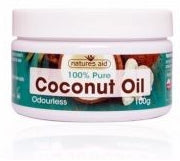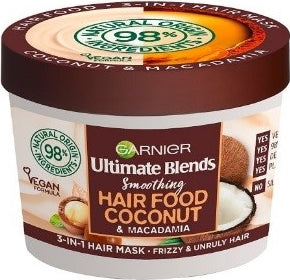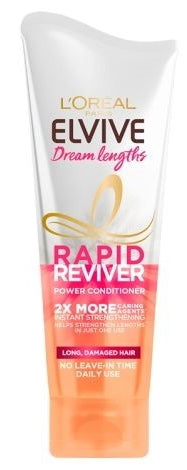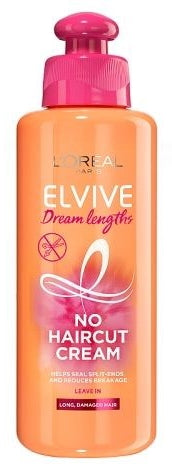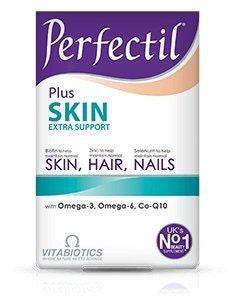The best hair loss oils: What they are and how to use them
If you are suffering from hair loss, you may have looked at products which contain certain oils that claim to help fight it. In this guide, we look at some of the most popular oils and explain whether you should incorporate them into your hair care routine.
Coconut Oil
Coconut oil is an incredibly popular hair supplement. You will often find it in shampoos and conditioners or even sold by itself. Its popularity has grown because it smells good, makes your hair shine, feels great and has supposed properties that support your hair.
Best coconut oil hair products
How to use coconut oil for hair
- Buy coconut oil that is in a solid or semi-solid state
- Place in a jar and add hot water
- Wait for coconut oil to turn to liquid
- Dampen your hair with warm water
- Pour some coconut oil into your hands and apply directly to your hair roots
- Cover the entire scalp
- Massage the coconut oil into your scalp for 2–3 minutes
- Leave oiled hair in a shower cap for at least 30 minutes
- Wash the oil out with shampoo
Is coconut oil good for hair?
Part of coconut oil’s popularity is due to claims that it can support healthy hair. You should note that many of these claims are anecdotal, meaning they lack scientific studies to back them up. However, that’s not to say there isn’t some evidence that coconut oil can be beneficial for your hair.
A study in 2003 tested whether coconut oil had any effect on preventing hair damage. It found that coconut oil helped stop damage to various types of hair made through combing.
Participants who used coconut oil as a pre-wash or post-wash were found to have less hair protein loss than those who used other haircare products. Protein loss is often caused by excessive straightening or combing and is commonly found in unhealthy hair.
The scientists conducting the study attributed coconut oil’s success to the fact that it is a triglyceride of lauric acid. This means the oil has a high affinity for hair proteins and is able to penetrate inside the hair shaft easily.
When it comes to coconut oil and hair growth/loss, there’s little scientific proof to show it works. That’s not to say it can’t help, and as coconut oil is healthy to eat and use in your hair, it’s not going to cause any harm to experiment.
Castor Oil
Castor oil is used in a variety of areas and known for its lubricating abilities. Created by pressing the seeds of the castor oil plant, it is a common ingredient in shampoos and conditioners because of its moisturising properties, which can keep hair healthy.
Best castor oil hair products
How to use castor oil for hair
You will often find castor oil included in specialised shampoos, conditioners or sprays. In this case, simply follow the instructions for the best possible results.
If you are using raw castor oil, follow the steps below:
- Pour approximately 200ml of castor oil into your hands
- Work the castor oil through your hair from roots to the tips
- Leave the oil in for 15–20 minutes
- Shampoo and rinse hair a number of times. Castor oil is incredibly thick and so you will need to rewash your hair.
Is castor oil good for hair?
Castor oil has been used for centuries to treat hair, but its benefits are mixed up in myths and old wives’ tales. The science behind castor oil is very vague, and extensive research finds little beyond a small-scale or pilot study.
This means you should take any claims about castor oil’s effectiveness in treating hair loss with a pinch of salt—especially from companies that sell castor oil for that very reason.
However, that’s not to say that people haven’t seen results. You can find hundreds of reviews online praising the benefits of castor oil.
You will often find castor oil combined with other ingredients in a shampoo or conditioner. This is because castor oil contains ricinoleic acid, which studies have found to have anti-inflammatory effects. The combination of ricinoleic acid and other active ingredients could improve your hair—it’s just a matter of giving it a try.
Olive Oil
Olive oil is a staple product in foods around the world. However, people have been using it for haircare for thousands of years. Olive oil contains emollients, which are moisturising ingredients to help hydrate your skin and hair while giving it a shiny look.
How to use olive oil for hair
- Measure out 60ml olive oil (around 4 tablespoons)
- Massage the oil from root to tip for 3–4 minutes
- Leave to soak for 15 minutes
- Vigorously rinse hair until the oil is out—this may take a few washes
- Use conditioner if you wish
Is olive oil good for hair?
Olive oil is high in emollients and vitamin E. Emollients are not only excellent for softening and conditioning hair but they possess antibacterial properties too.
If you have an itchy scalp, you may be suffering from dandruff. Olive oil can help keep these conditions at bay. The vitamin E in olive oil can fight damage from sunlight and pollution. In this regard, olive oil has benefits for dry/damaged hair.
Not only will olive oil protect hair, but it can also strengthen it and help it grow. According to a study in 2015, a compound found in olive oil known as oleuropein helps stimulate hair growth, although there are few other studies to support these findings. More studies will be needed to fully understand the benefits of olive oil and whether it can be used for promoting hair growth.
Argan
Argan oil is made from kernels of the fruit of the argan tree, native to Morocco. For centuries, it was used mainly as a cooking product, but it’s recently become incredibly popular as a beauty and cosmetic product for haircare and skincare. Many big-brand products use argan oil because of its many supposed benefits, and it has since gained the nickname ‘liquid gold’.
Best argan oil hair products
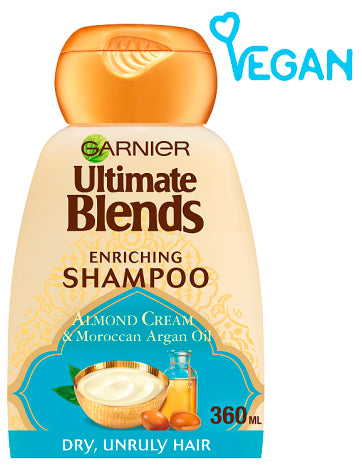 |
Garnier Ultimate Blends: Argan Oil and Almond Cream Dry Hair Shampoo
|
How to use argan oil for hair
There are two main ways to use argan oil for your hair:
Before shampooing
- Apply a thick layer or argan oil to your hair
- Ensure your whole scalp is covered
- Comb oil from the ends up to your roots
- Leave for 5–10 minutes
- Wash out with a shampoo
As a quick styling product
- Pour a small amount on your hands
- Run hands lightly through your hair
- Flatten any out-of-place hairs with remaining oil
Is argan oil good for hair?
Argan oil’s main benefit is its moisturising properties. It is full of fatty acids which have been found to help lubricate the hair shaft and maintain hair moisture. These fatty acids also have protective effects that can prevent damage caused by washing and styling hair.
Does argan oil help stop hair loss?
Argan oil can fight hair loss depending on what is causing it. The oil is anti-inflammatory and contains antioxidants which are good for the skin. These properties can help tackle skin conditions which cause hair loss, such as psoriasis and dermatitis.
While argan oil is not known for promoting hair growth, it can help protect your hair against damage from pollution, sun and styling, which can all cause hair loss. This makes the product a worthwhile investment if you are trying to protect your hair.
Essential oils
Essential oils are plant oils in concentrated liquid form, obtained by distillation or evaporation. They are most well-known for their aromatic properties, but they have been used in homeopathy for many years. They come from a variety of plants.
Best essential hair loss oils:
- Evening primrose
- Lavender oil
- Peppermint oil
- Rosemary oil
- Lemongrass oil
- Ylang-ylang essential oil
- Black seed oil
- Cedarwood essential oil
Best essential oil hair products
How to use essential oils for hair
You will need to combine drops of essential oil with a carrier oil such as coconut oil. As essential oils are very strong, they need a carrier oil to dilute them, reduce their potency and cover a larger surface area.
That doesn’t mean carrier oils serve no other purpose. One of the most popular carrier oils for hair is coconut oil, and the combination of coconut oil and essential oil can create an excellent defence against hair loss.
Note: these are general instructions. Always read the label.
- Combine 7–10 drops of essential oils (e.g. ylang-ylang essential oil) with 3 tablespoons of carrier oil (e.g. coconut oil)
- Massage into the scalp for 2 minutes
- Leave oil in hair for a minimum of 10 minutes
- Shampoo and wash until there is no oil left in your hair
- Repeat the above process several times a week
Are essential oils good for hair?
Because there are so many essential oils, it’s hard to confirm which oils will benefit your hair and which won’t. Our recommended essential oils each have at least one study to back up claims about their benefits:
- Evening primrose: Evening primrose contains arachidonic acid, which has been shown to promote new hair growth.
- Lavender oil: A 2016 study on mice found that lavender oil was able to generate faster hair growth.
- Peppermint oil: A 2014 study tested the effects of peppermint oil on mice. It found that peppermint oil increased the number and depth of hair follicles and helped growth.
- Rosemary oil: A 2015 study compared rosemary oil with minoxidil, an ingredient found in lots of hair growth treatments. It found that rosemary oil performed equally as well as minoxidil, while also causing less itching.
- Lemongrass oil: The main benefit of lemongrass oil is its ability to tackle dandruff. A 2015 study found that lemongrass oil reduces dandruff after one week of daily use.
Risks
The main risk you face when using essential oils is suffering an allergic reaction or irritated skin, as the oils can cause burning, discomfort and redness. To combat this issue, make sure you test a small amount on your skin before you use more of the product.
Pumpkin seed oil
Pumpkin seed oil has been associated with several health benefits, like mood boosts, lower cholesterol and a healthy prostate. While further studies are required to support most of these claims, there’s no doubt that pumpkin seed oil is beneficial to your health.
How to use pumpkin seed oil for hair
You can either take pumpkin oil by mouth or by applying it directly to your hair.
By mouth
- Take between 1 teaspoon and 1 tablespoon three times a day
Applying it directly to the scalp
- Warm some pumpkin seed oil. Make sure it’s not too hot before placing it on skin!
- Wash and shampoo your hair
- Massage the warm oil into your scalp to stimulate the hair strands and help blood circulate
- Wrap your head in a towel or shower cap and wait 20 minutes
- Shampoo until you have removed the oil from your hair
Is pumpkin seed oil good for hair?
A 2014 study tested the effect of pumpkin seed oil on hair regrowth in men with androgenetic alopecia (male pattern baldness). The study found that at 12–24 weeks, those men who had taken pumpkin seed oil had 30% and 40% mean increases in hair counts from baseline.
However, the researchers generated mixed results depending on how they evaluated the hair regrowth. They also stated that further studies will be needed to confirm the benefits of pumpkin seed oil in helping hair to grow back.
Emu oil
Aboriginals in Australia have been using emu oil for hundreds of years. Emu oil is rendered from a fatty deposit on the back of the emu bird. It is only extracted after the bird has been butchered for its meat.
While it may seem odd to put animal fat into your hair, it has been found to fight scalp infections and, in turn, hair loss.
How to use emu oil for hair
- Find an empty squeeze bottle
- Fill half with coconut oil
- Add a quarter of pumpkin seed oil
- Add a quarter of emu oil
- Add any essential oils you wish
- Shake the bottle
- Apply to your scalp after a morning or evening shower
Is emu oil good for your hair?
Emu oil will not directly stop any hair loss or help hair grow back. However, that’s not to say that it won’t benefit your scalp.
A 1998 study found that emu oil contains non-toxic, anti-inflammatory properties. Inflammation and an itchy scalp can cause hair loss or at least be one of its side effects. While emu oil may not stop the hair loss, it can at least subdue the inflammation and discomfort.
A 2017 study found that emu oil also contains skin-penetrating properties. When emu oil is included in a compound (e.g. shampoo), it can act as a delivery system to enhance the potency of topical medication.
Although emu oil doesn’t directly make hair regrow, it can still help your hair in other ways and support other products that may help stop hair loss.
Jojoba oil
Jojoba oil is actually a type of wax extracted from the seeds of the jojoba plant. Popular in both food and cosmetics, it is incredibly versatile and has moisturising and anti-inflammatory properties.
Best Jojoba oil hair products
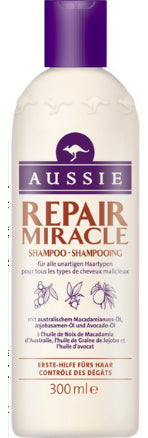 |
Aussie Repair Miracle Shampoo
|
How to use jojoba oil for your hair
- Use 1 tablespoon for short hair or 2 tablespoons for long hair
- Warm up oil in the microwave (make sure it doesn’t get too hot!)
- Apply to the top of the scalp
- Work the oil through hair strands, right to the tips
- Leave for 20 minutes
- Wash the oil out with shampoo and conditioner
Is jojoba oil good for your hair?
The main benefit of jojoba oil is that it moisturises your hair and skin. This helps strengthen your hair and stop it breaking. The oil’s moisturising properties can also moisturise your dry scalp and treat dandruff.
Jojoba oil is also excellent for micro-emulsion. This means it can be used in hair loss shampoos to carry active ingredients and make them easier for the skin to absorb.
While there has been no research to prove that jojoba oil can directly improve hair growth, it can carry the active ingredients that facilitate that process.
Related content
What causes hair loss? Conditions, hormones and medications that can cause it
Hair loss shampoos: do they work, how do they work and the best shampoos available [2019]
The best hair loss treatments for men and women: comparing the options


